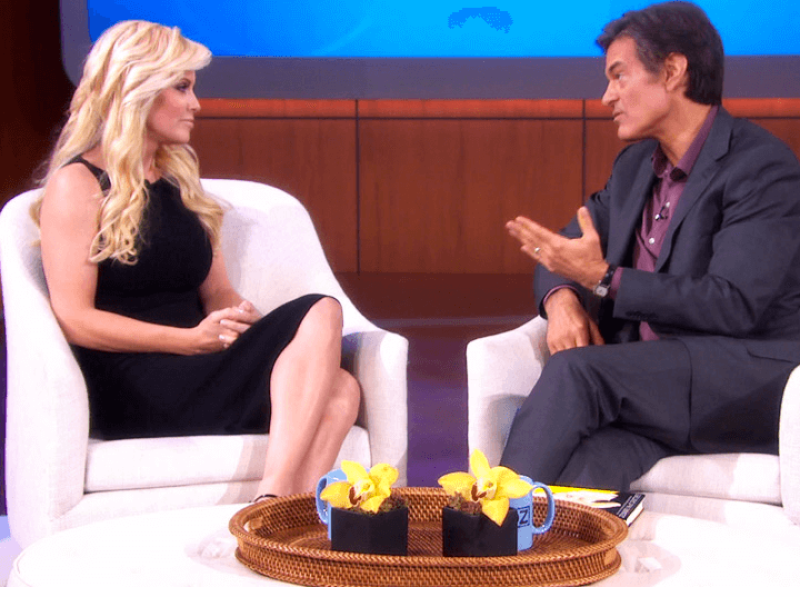Autism is a term that strikes fear in the hearts of parents and fuels contentious arguments among friends, families, and internet strangers.
Though the 1998 Andrew Wakefield study linking the MMR vaccine to autism has been thoroughly debunked, parents continue to fear childhood vaccines to this day. This is partially due to celebrity quacks like Jenny McCarthy, Rob Schneider, Mayim Bialik, and sadly even Dr. Oz perpetuating the myth that vaccines are harmful.
Not only has Dr. Oz recently added his fuel to the anti-vaccine fire, but he’s planted the seed of GMO-autism misinformation into the collective American consciousness. He recently featured Zen Honeycutt of anti-GMO group Moms Across America, giving her a national platform to make fabricated claims that eliminating GMOs “cured” her son’s autism.
Despite the loud voices of disinformation, the scientific community has overwhelmingly agreed that there is no causal link between vaccines or GMOs and autism. Scientists previously learned that a combination of numerous, very common heritable variants contribute significantly to autism risk. These variants don’t individually increase an individual’s autism risk; the causal factor is inheriting specific permutations of these variants.
Corroborating the fact that GMOs and vaccines don’t cause autism, scientists have now linked mutations in over a hundred genes to autism in two recent studies published in Nature. Unlike the heritable variants I mentioned, about 30 percent of those found in these studies are de novo mutations, meaning they occurred either within the sperm or egg cell from which the baby was conceived, or early in embryonic development. In conjunction with inherited variants, these de novo mutations appear to contribute to causing the more severe, lower IQ autism symptoms on the ASD spectrum. Higher-functioning autism seems to be influenced by inherited variants rather than de novo mutations. Notably, many disease-causing mutations are recessive, meaning that a child must inherit two defective copies, one from each parent. Interestingly, autistic individuals with any of six of the strongest causal variants are heterozygous, meaning they only inherited a defective copy from one parent.
These are the first studies to identify such a large number of high-confidence genes. Of the causal variants identified, 60 gene variants each have a whopping 90 percent chance of increasing autism risk.
These mutations were found by exome sequencing (sequencing only the protein-coding regions) of over 2500 families; usually the autistic child, and unaffected siblings and parents. The variants interfere with three pathways in which deleterious mutations affect typical development. These include effects on normal synaptic function, and normal transcription of DNA.
What are molecular pathways?
Molecular pathways are complex interactions between myriad products created by multiple genes. The human genome has about 20,000 genes, each of which codes for a handful of proteins. Genes all interact in intricate collaboration providing precursor and intermediate products to enable ultimate functional outcomes. When one of these steps goes wrong, like in the case of these autism mutations, the outcome is either defective or doesn’t happen at all.
Here is a very simplified analogy. Consider an everyday task, like hanging a picture on the wall. It requires a couple of nails, a hammer, and a framed picture. A skilled person needs to wield the tools and execute each step to achieve the outcome of a frame placed neatly on the wall. One of the many tasks is getting the nail into the wall. But if the hammer factory messes up and makes a wrench instead of a hammer, or the nail is bent, or the handyman or woman is injured …just think of the repercussions. Either the picture is poorly hung, or doesn’t end up on the wall at all.
The discovery of these high-confidence genes not only advances our knowledge and understanding of autism. These high-confidence variants will undoubtedly have powerful applications in targeted drug development, and early diagnosis and behavioral interventions.
Aside from these worthy implications, these studies offer more proof to refute the dangerous ideas that GMOs and vaccines cause autism. While we know that diseases like autism stem from a complex interaction of genetics and environment, it’s clear that genetics play an irrefutably strong role. Dr. Oz, Moms Across America, GMO Free USA, Jenny McCarthy, Natural News, and others in the fear-mongering business have done enough damage to America’s scientific literacy, and have fueled more than enough anxiety. Their victim-blaming has already gone too far. It’s encouraging to see work like these recent studies providing much-needed debunking of hogwash.
Kavin Senapathy is a contributor at Genetic Literacy Project and other sites. She works for a genomics/bioinformatics R&D in Madison, WI. She loves all things genetics, genomics, and bioinformatics. Her interests span the human and agricultural realms. Opinions expressed are her own and do not reflect her employer. Follow Kavin on Facebook, Twitter @ksenapathy and Google +
Additional Resources:































